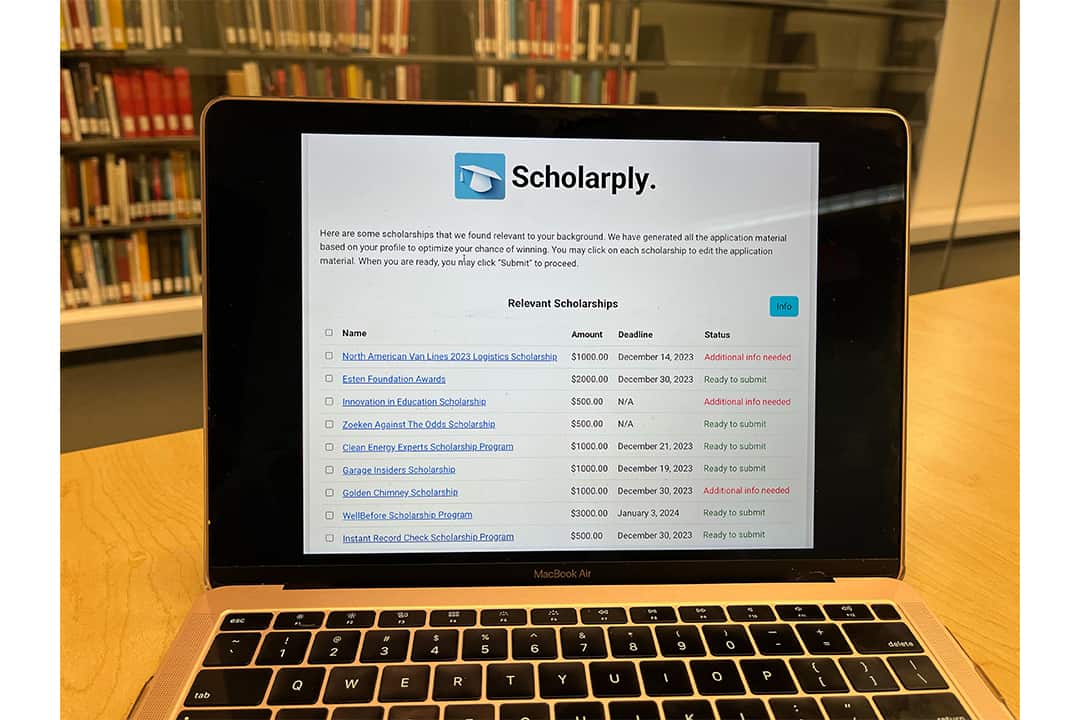Like many people, Daniel Choi, a fourth-year mechanical engineering student, finds scholarship applications a hassle. “I’ve always neglected applying to scholarships because of how much time it takes,” he told The Varsity.
While browsing Reddit, he came across a post advertising Scholarply, an app that U of T PhD students Aaron Tan, Angus Fung, and Haitong Wang created to help users find relevant scholarships and write their applications. The service uses large language models, the same artificial intelligence (AI) models behind ChatGPT. As of now, Scholarply is still in its development phase, and Choi signed up to be one of the beta testers.
“For a scholarship that asked me to describe how I overcame a challenge, Scholarply hallucinated a story about how I struggled with my studies in my first year when dealing with my mother’s sudden illness.”
Scholarply is inspired by the founders’ own struggles with applying for scholarships. Tan told The Varsity, “[Applying] just takes up too much time that we really don’t have. But as students, we obviously need financial support to continue our education.”
Wang also expressed the difficulty of finding scholarships as an international student. He noted that a lot of scholarships are only open to domestic students to begin with — and as someone who speaks English as a second language, Wang noted that it is difficult to compete with native English speakers when writing application materials.
Navigating the scholarship navigator
Like Choi, I was intrigued by the premise and also signed up to be a beta tester. When you sign up, Scholarply asks for information like your name, school, program, year of study, résumé, and academic transcript. Drawing from that information, it searches for relevant scholarships and generates responses to scholarship questions.
In less than 10 minutes, Scholarply showed me nine scholarships I could qualify for. However, not all of them were exactly relevant to my experiences as an English and book and media studies major. One of the scholarships was related to logistics and supply chain management, which is a bit of a stretch from the experiences on my résumé. For a scholarship that asked me to describe how I overcame a challenge, Scholarply hallucinated a story about how I struggled with my studies in my first year when dealing with my mother’s sudden illness.
Choi had a better experience with Scholarply than I did. His profile matched most of the 10 scholarships Scholarply suggested for him. This is not surprising — Scholarply is currently optimized for students with STEM profiles, which is great for mechanical engineering students like Choi.
That being said, the Scholarply team is looking to increase its scholarship offerings and expand the demographics of its scholarship offerings.
Scholarply’s key features include suggesting feedback for how users can improve their application essays. It also gives the user a “ScholarScore,” which ranks their application against other applicants using Scholarply. With this feedback, users can edit their applications accordingly — or they can submit revision requests about their application to Scholarply, which will edit the generated draft to address the request.
The ScholarScore comes from Scholarply’s AI, which analyzes information from the scholarship providers themselves, such as their specific requirements, what they are looking for in candidates, and their company values. The AI then evaluates each applicant through the perspective of the scholarship provider.
Is it ethical?
Tan was optimistic about how the widespread use of AI will affect the fairness of scholarship applications. “Everybody’s going to have beautifully written essays… So the only way for donors, providers, and us to give an objective score… is to objectively look at the content that’s in those applications, rather than how beautifully written those applications are,” he said.
But will scholarship providers allow the use of AI at all? U of T states on its webpage on awards, scholarships, and bursaries that “students and applicants found to have used generative AI (e.g., ChatGPT) to create content that is presented as their own ideas will be disqualified from award eligibility. This prohibited use of generative AI for content creation will be considered an academic offence.”
Scholarship donors are also starting to get concerned about the use of AI. In an email to The Varsity, The Jean Lumb Foundation, which provides scholarships to high school students, wrote, “We may consider adding a checkbox to confirm that the 500-word essay that we require is original.”
Tan affirmed that he and the rest of the team recognize universities’ rules regarding AI usage, including U of T’s. “We have been maintaining ongoing communication with universities across North America to stay informed and compliant in the design of Scholarply,” he wrote in an email to The Varsity.
Tan emphasized that the Scholarply team designed the tool as an assistant for writing user applications, not a replacement for them. “Think of Scholarply as a digital guidance counsellor: it takes the user’s profile, based on the information they provide, and interacts with them to elicit more detailed responses and insights.” The team is working on a new feature that prevents submissions with zero personal input from users.
From their base of beta testers, Tan said the Scholarply team has not received concerns about the ethics of using AI in scholarship applications. “People are just happy to finally see a more modern, streamlined solution to what is otherwise a tedious problem,” Tan said. “People want to get access to it… and people want to see what this can do for them.”



No comments to display.